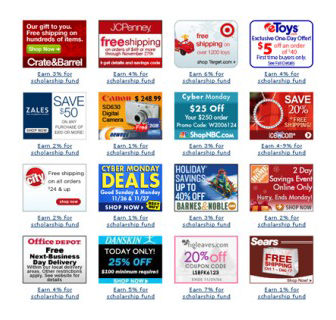We totally understand why you feel the need to offer coupon codes. Really, we get it. We’ve read the same survey results you have, with titillating stats like:
• 74% of shoppers search multiple online coupon sources every week, and many spend up to an hour shopping around for the best deals
• 55% of online shoppers say they use online coupons
• 66% of shoppers project that they will use one in the next 12 months
• Nearly 30% say they use them for 50% of their online purchases
• Online shoppers expect to save 30% more in the next year through increased coupon code usage
And we’re sure you know as well as we do about all those conglomerate sites out there that do nothing but compile lists of coupon codes, right?
We’re talking about sites like…
- retailmenot.com
- couponmountain.com
- couponcollie.com
- coupontsunami.com
- couponcodesaving.com
- coupongreat.com
- couponmom.com
- hotcouponworld.com
- couponnetwork.com
- savings.com
- coupontrade.com
The list could go on and on.
You probably already realize a large percentage of your customers pause before they click “order now” or “submit” to go search these helpful coupon sites and see if they can find an active coupon code they can use to get a discount on their order. Some of you actually incorporate coupon codes into your marketing strategy, purposely creating codes that you want to go viral Pretty smart.
But did you also realize that many of these coupon collectives also run PPC (pay-per-click) ads on their sites? If you’re not careful, your ads could end up running right next to your pilfered promo codes. Now your existing customer is going to click on your ad, coupon code in hand, ready to save money on an order they would have paid full price for. Ouch. You got stung twice- not only did you have to give that customer a discount for using the coupon code, you also upped your ad spend when they clicked on your PPC ad on the coupon site.
Bummer.
Let’s turn that frown upside down and try to stay solution-focused here.
First off, you know you could be using a third-party verification service to manage your coupon codes right? Platforms like SheerID’s allow you to choose who can redeem your coupon codes and when. You want to offer 10% off to all guys named Ed every other Thursday with the code EdRocksMySocks? Lucky for all the Eds out there, you can now make that happen. Try not to let it go to your head.
Want a more realistic example of how you can use your newfound coupon management powers? How about using coupon codes to test which markets are going to give you the best ROI before you launch a huge targeted campaign? With a verification system like SheerID’s in place, you can do just that. Say you’re trying to figure out whether the military, teachers, or small businesses are going to be your most profitable market. Try offering a military discount, a teacher discount, and a small business discount for a set period of time. You can either offer them all at once, or you can stagger your promotions, as long as you offer the same percentage off for the same amount of time. After your coupon codes expire, you’ll know which market liked your offer best because only military, teachers, and small businesses could use each targeted coupon code. Who says tests can’t be fun?
So now we know how to prevent codes from going viral when we want them to stay targeted.
But what do we do with our PPC ads? Well, there are three schools of thought here. Either way, you’re trying to break the behavior and train your customers that there’s really no point in seeking out coupon codes in the first place.
Strategy 1:
They’ll take care of themselves.
One of the helpful features of most of these coupon code sites is that they allow users to provide feedback to let their fellow coupon seekers know whether or not the codes are active and working. Your coupon codes will still get posted, there’s no real way around that, but once a couple of unqualified customers (those who aren’t military, teachers, etc.) try to use the codes and post feedback that the codes didn’t work for them, people will stop trying to use them, assuming they’re inactive.
Strategy 2:
Reclaim your customers before they hit the coupon sites.
You can run your own PPC ads on keywords that coupon seekers are most likely to use in their searches, and convince them their search is fruitless. True, each coupon site probably has a few super-users who head directly to their site when they’re looking for coupons, but a recent study showed that a large percentage of coupon code seekers spend an hour a week actively searching for codes. Search engines are their best friend. So here’s what online retailers like Zappos are doing.
Step 1: Create a “Truth about Coupon Codes” landing page. This page explains why your company doesn’t offer coupon codes (you already have low prices, you offer free shipping, etc.) Be sure to include lots and lots of keywords. Your goal here is to convince your customers there’s really no point in visiting those coupon sites before they order from you. Send traffic from the page directly into your online store.
Step 2: Run “anti” coupon code PPC ads. Your ads might say something like, “Zappos. No need for gimmicks or coupon codes, we offer low prices daily. www.Zappos.com/FreeShipping/”. Direct these ads to your “Truth about Coupon Codes landing page”.
Eventually, you’ll train your customers that searching for coupon codes is pointless, and they’ll stop their coupon-seeking ways. This strategy is only a good option if you never want to run coupon codes that you actually want to go viral as part of your marketing strategy.
Strategy 3:
Prevent your PPC ads from displaying on coupon code sites.
It’s possible to use your filters in Google Ads to weed out all those pesky coupon sites so your PPC ads simply aren’t there anymore. Your existing customers can’t click on an ad that isn’t there. There can be downsides to this approach if you’re in a competitive market. If your competitors are running PPC ads on coupon code sites, it might be more important for you to have a presence there too than to save a little money by preventing repetitive clicks.
If you have a PPC manager, they’ll be able to advise you which strategy is best for your company. If you don’t, you’ll probably figure it out fairly quickly with a little testing.
If you want to chat more about setting up a verification system for your coupon codes, you know how to reach us.
Isn’t life beautiful when you have the ability to decide who gets to use your coupon codes, when they can redeem them, and how they’re advertised?
For more fun stats and coupon code management solutions, request a free copy of our white paper, “Our Bittersweet Relationship With Coupon Codes”.

